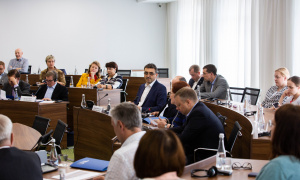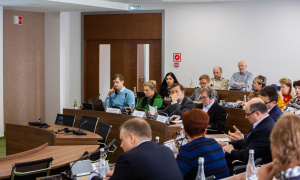
World experts have discussed the development of the IEM
The members of the Supervisory Board of the TSU Institute of Economics and Management, representing successful global companies and business schools, discussed the vector of development of the IEM and identified key strategic tasks for the future.
The meeting was attended by Oksana Kozlovskaya, the Chairman of the Supervisory Board (also Chairman of the Legislative Duma of Tomsk Region), Eduard Galazhinsky (Rector of TSU), Viktor Dyomin (Vice-Rector for Educational Activities), Evgenia Nekhoda (Director of the IEM), Valery Katkalo (First Vice-Rector of HSE, Dean Faculty of Business and Management), Jean-Paul Larson (Honorary Professor of the Paris Commercial School, France), Andrey Filatov (General Director of SAP in Russia and the CIS), Andrey Tyutyushev (Chairman of the Board of Directors of Agrarian Group), Sergey Belov (Professor, Coordinator of university programs IBM), Svetlana Mironyuk (executive director of PwC in Russia), and heads of departments of the Institute, directors of the office and the heads of the educational programs implemented in the IEM.
At the beginning of the meeting, Oksana Kozlovskaya, the Chairman of the Supervisory Board, introduced the new members of the Supervisory Board. With the report Institute of Economics and Management at TSU: the Results of the Launch Stage (2016–2018) and Tasks for 2019–2021, the Director of IEM Evgenia Nekhoda delivered a speech, thanked Viktor Dyomin, who led IEM fr om its inception until April of this year, and the entire staff of the Institute for the work done, voiced its results and tasks for the near future.
All members of the Supervisory Board noted obvious progress in the development of the Institute and positively assessed the results presented.
The Center for Entrepreneurship began its work. The Entrepreneurship discipline is taught in 12 faculties to more than 600 students, we conducted a large number of events, including the opening of the Tele2 branded audience with modular equipment. We also implemented the largest project “Startup as a Diploma” with the Tehnospark company, on the basis of IEM passed the regional stage of the Enactus contest, where our team won the first place, and we passed to the final.
On internationalization, certain results were achieved: we launched the Parallel Bachelor's Degree program in Business and Management with the London School of Economics and Political, wh ere 11 people are studying now. We upgraded the program International Management in English. And also some exchange programs began to work.
DIGITALIZATION AND INTERNATIONALIZATION
Valery Katkalo voiced proposals for the next meeting: it is necessary to embed the Institute in a modern digital agenda; IEM should contribute to the TSU progress in project 5-100. Also, the creation of a modern university business school involves the question of what kind of ecosystem it is building around itself. Obviously, the topic of advanced training of faculty was also very prominently shown, it is necessary to increase the quality of English proficiency. Participation in international professional associations and professional communities is important because it immediately changes many positions.
This topic was developed by Jean-Paul Larson: Digitalization and internationalization are two main trends. We need to clearly understand: the IEM wants to be represented in the Siberian Region, or go beyond it? It is clear that, ideally, we need to expand our presence in Asian countries, to make these institutes attractive for applicants. Apply modern learning technologies: blend-learning, case-study, and others. The second is English, both teachers and students should know it. He proposed to create a flagship program that would make the Institute recognizable outside of Tomsk.
FOCUS ON TEACHERS
The question about the development of the faculty also received a detailed discussion.
IEM IS THE CENTER OF COMPETENCE
The discussion was summarized by Eduard Galazhinsky: “We are completing a three-year cycle, summing up some results. Why does the university need this project? It is very important that the Institute become a center of competence at the university. In essence, we are creating a team that should help TSU to increase its competence in the field of economics, management, and innovation. You also need to learn how to rebuild your educational logic to the needs of the market and partners. This experience will be deployed to the university as a whole. We will add a partner ecosystem. Already, the heads of large companies are here and participate in the discussion of the development of the university. Let's run a series of territory development projects, analytics, useful for the region. We will attract companies because we need to move forward together. This will be the goal of the next period. ”
The meeting was attended by Oksana Kozlovskaya, the Chairman of the Supervisory Board (also Chairman of the Legislative Duma of Tomsk Region), Eduard Galazhinsky (Rector of TSU), Viktor Dyomin (Vice-Rector for Educational Activities), Evgenia Nekhoda (Director of the IEM), Valery Katkalo (First Vice-Rector of HSE, Dean Faculty of Business and Management), Jean-Paul Larson (Honorary Professor of the Paris Commercial School, France), Andrey Filatov (General Director of SAP in Russia and the CIS), Andrey Tyutyushev (Chairman of the Board of Directors of Agrarian Group), Sergey Belov (Professor, Coordinator of university programs IBM), Svetlana Mironyuk (executive director of PwC in Russia), and heads of departments of the Institute, directors of the office and the heads of the educational programs implemented in the IEM.
At the beginning of the meeting, Oksana Kozlovskaya, the Chairman of the Supervisory Board, introduced the new members of the Supervisory Board. With the report Institute of Economics and Management at TSU: the Results of the Launch Stage (2016–2018) and Tasks for 2019–2021, the Director of IEM Evgenia Nekhoda delivered a speech, thanked Viktor Dyomin, who led IEM fr om its inception until April of this year, and the entire staff of the Institute for the work done, voiced its results and tasks for the near future.
All members of the Supervisory Board noted obvious progress in the development of the Institute and positively assessed the results presented.
The Center for Entrepreneurship began its work. The Entrepreneurship discipline is taught in 12 faculties to more than 600 students, we conducted a large number of events, including the opening of the Tele2 branded audience with modular equipment. We also implemented the largest project “Startup as a Diploma” with the Tehnospark company, on the basis of IEM passed the regional stage of the Enactus contest, where our team won the first place, and we passed to the final.
On internationalization, certain results were achieved: we launched the Parallel Bachelor's Degree program in Business and Management with the London School of Economics and Political, wh ere 11 people are studying now. We upgraded the program International Management in English. And also some exchange programs began to work.
DIGITALIZATION AND INTERNATIONALIZATION
Valery Katkalo voiced proposals for the next meeting: it is necessary to embed the Institute in a modern digital agenda; IEM should contribute to the TSU progress in project 5-100. Also, the creation of a modern university business school involves the question of what kind of ecosystem it is building around itself. Obviously, the topic of advanced training of faculty was also very prominently shown, it is necessary to increase the quality of English proficiency. Participation in international professional associations and professional communities is important because it immediately changes many positions.
This topic was developed by Jean-Paul Larson: Digitalization and internationalization are two main trends. We need to clearly understand: the IEM wants to be represented in the Siberian Region, or go beyond it? It is clear that, ideally, we need to expand our presence in Asian countries, to make these institutes attractive for applicants. Apply modern learning technologies: blend-learning, case-study, and others. The second is English, both teachers and students should know it. He proposed to create a flagship program that would make the Institute recognizable outside of Tomsk.
FOCUS ON TEACHERS
The question about the development of the faculty also received a detailed discussion.
- At the moment it is very important to assess the effectiveness of the programs and the success of graduates. If we correctly construct the metrics and have feedback from employers, understand the degree of their relevance, it will be clear what programs need to be upgraded and how to develop them. It will be useful to the whole university. Hence, there may be a request and requirements for the contract and the quality of teachers. - noted Victor Dyomin
- One of the indicators may be the percentage of students who entered the work in their specialty. And also their start salary for which they got a job, - Andrey Tyutyushev added.
IEM IS THE CENTER OF COMPETENCE
The discussion was summarized by Eduard Galazhinsky: “We are completing a three-year cycle, summing up some results. Why does the university need this project? It is very important that the Institute become a center of competence at the university. In essence, we are creating a team that should help TSU to increase its competence in the field of economics, management, and innovation. You also need to learn how to rebuild your educational logic to the needs of the market and partners. This experience will be deployed to the university as a whole. We will add a partner ecosystem. Already, the heads of large companies are here and participate in the discussion of the development of the university. Let's run a series of territory development projects, analytics, useful for the region. We will attract companies because we need to move forward together. This will be the goal of the next period. ”


